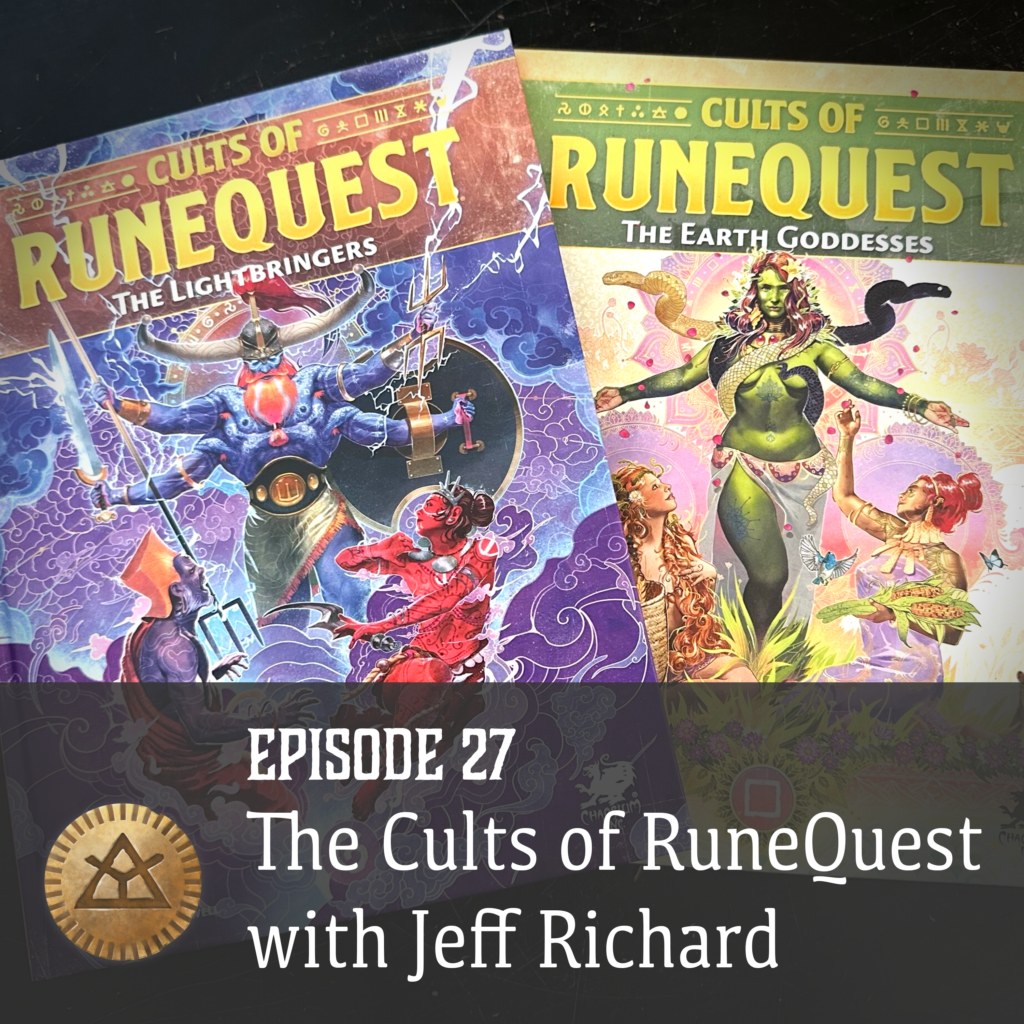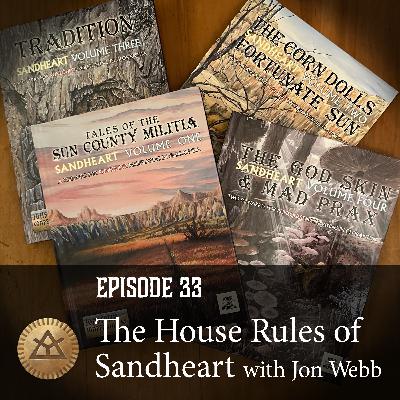Episode 27: The Cults of RuneQuest
Description
 </figure>
</figure>We finally worked up the courage to get Jeff Richard on our show!
Jeff is the Creative Director and Chair of Chaosium, the lead writer on most of the RuneQuest books, the lead art director on RuneQuest, and the editor for Pendragon. Jeff is also generally responsible for the look and feel of the Chaosium books.
Jeff’s Gaming History
Jeff’s roleplaying career started in the late seventies with not being able to make much sense of the original D&D rules but getting the system from playing Gamma World and Metamorphosis Alpha. It was in Middle or High School when one of his friends brought a copy of RuneQuest and advertised it as a game where you could play anything in the setting, even a were-pig. Even better, they realized it was in the same setting as that board game White Bear and Red Moon which they had played before.
Jeff had been gaming for quite some time before he and Greg Stafford started writing together in the late 1990s. In the 2000s Jeff and Rick Meints ended up pretty much taking over the leaderless Issaries Inc. with its Hero Wars/HeroQuest line, putting out the second (generic) edition of the HeroQuest rules and campaign books for Sartar and Pavis. A few years later Greg Stafford regained control over Chaosium and brought the Moon Design crew (expanded to include Michael O’Brian aka MOB and Neil Robinson) in to take over the company.
Ludo mentions that Jörg told him just before the recording about the werepig. Jeff confirms that Pinky Petunia was his first character (who didn’t last very long), a kamikaze werepig which was the coolest experience to a 14 or 15 year old who had been playing just AD&D and related games with their very limited set of character classes and races.
Jeff also was part of the Seattle Farmers Collective, a group of Seattle roleplayers including Jeff, David Dunham, Neil Robinson, Pam Carlson, Dana Shack (?), Dave Pearton and others which engaged in a number of ways of exploratory gaming in the nineties.
David Dunham had managed to marry the Pendragon rules with RuneQuest, which on retrospect is pretty easy, and the Collective played a couple of generational games in various places in Glorantha. What was interesting was that the characters were the local community, and they were involved in these Bronze Age feuds, and the more the characters succeeded the worse the things would turn out.
At the time, Jeff was reading a lot of Icelandic Sagas and researching theories of feuds, of how feud systems would end up to create an equilibrium.
A lot of those experiences worked their way into David Dunham’s computer game King of Dragon Pass, and then, twenty years later, a lot of that worked its way into the current edition of RuneQuest.
Ludo mentions that a lot of people who play RuneQuest might recognize its setting as that of the King of Dragon Pass or Six Ages games, much like Jeff had the experience with the White Bear and Red Moon boardgame.
Jeff talks about the demography of the players of RuneQuest and the fans of Glorantha. It is very clear that a lot of old-time fans are getting back into it, but sales numbers indicate that it is largely a new audience. There are people coming in from David Dunham’s computer games, others come in from the Morrowind/Skyrim connections (mentioned in this interview with the designers).
Jeff often jokes that old RuneQuest is The Velvet Underground of gaming, selling 20,000 copies but everybody who ended up owning a copy leaving a big impression. Ludo inserts the saying “You might not know RuneQuest, but RuneQuest is your favourite game designer’s favourite game.”
Jeff argues that this changed in the last decade or so as RuneQuest had largely been dead as a rules system since the early nineties. Now it has a new edition, it has a very active fan-base, it is showing up at conventions, its audience is growing – Jeff will probably have to retire that Velvet Underground joke. What would have happened if that band had ever actually caught on?
Ludo points out the good influence of new people coming in to the setting, and mentions our Gloranthan Initiation series of interviews where we talk to people comparatively new to the setting (which we upload in between the main episodes of this podcast).
Asked for roleplaying games outside of the BRP family, after rattling off a number of games published by Chaosium (Pendragon, Call of Cthulhu, Nephilim) Jeff mentions Vampire: The Masquerade as a game he enjoyed a lot, and Ars Magica, which he did a couple of campaigns with. Both these games offered something else than going underground knocking down doors and taking people’s shit. Other games include the old West End Games Star Wars, FGU’s Bushido (which shared one of the authors with RQ3’s Land of Ninja). Ludo points out Bushido’s battle rules, while Jeff emphasizes its implementation of the samurai code of honour. Jeff names Chris Klug’s James Bond 007 as one of his favourite games of all time, too, comparing it to Pendragon for brilliantly designed games.
Ludo points out Jeff’s role in the first ever Gloranthan podcast, Tales of Mythic Adventures which he co-hosted with Michael O’Brian (aka MOB). Jeff explains that setting up a regular podcast or just any kind of regular show is a gigantic time commitment (you can nearly hear Ludo and Jörg nodding sagely at that), and for some reason people thought that it was more important that Jeff and MOB write and create books for there to be podcasts about.
Jörg points towards Jeff’s work on the Prince of Sartar webcomic which went into indeterminate hiatus for the same reason. Again, some people out there put more value in new books being produced rather than Jeff and Kalin Kadiev producing an experimental webcomic. Ludo recalls people crediting the webcomic for drawing them back into the Glorantha hobby. Again, Jeff blames the time commitment, but calls it a platform to play around with the look and feel of things, and you can see a lot of impact from that in the later art direction and the look and feel of the RuneQuest books.
The Cults of RuneQuest Series
With this, we have completed the introduction of our guest, and we can drop into the Cults of RuneQuest series. Ludo quotes Jeff having said that this was the biggest project he had worked on in his career so far, and asks whether Jeff can take a break now or whether he is already diving into his next big project.
Jeff replies that there are no breaks. One of the differences between fan publications and his current position is that he does that for a living, so he can’t sit back and take a nice pause now a project gets fulfilled. At the end of the day, what Chaosium is all about is to create new books and new adventures.
Jeff is in the process of looking at the first pass of the layout for the Lunar book, looking into the refining, and hoping that it will be off to the printer in the next couple of weeks. After that there will be the Guide to Dragon Pass, and after that either the Sartar campaign book or the Solar volume of Cults of RuneQuest. Jeff describes the situation of his layout people as working on a conveyor belt. Jeff enjoys that RuneQuest now is in a situation where Chaosium could realistically schedule six to eight RuneQuest books in any twelve months period. Other than RuneQuest, the Pendragon line is getting up to a similarly lively publication schedule. Ludo allows himself to be distracted from Glorantha giving his appreciation for the layout style of Pendragon with all those little medieval illuminations in the margins.
Jeff compares the word count of the Cults books with that of the Guide, both being in roughly the same magnitude. Asked what was the most complicated aspect of the project, Jeff confirms it was the inter-connectedness which made the project so much harder, making sure that all of these rules systems tie into each other. Jeff describes the Guide as a fictional encyclopedia, a purely narrative description of the setting which doesn’t need to be mechanically linked. For example, when you go through the associated cults you need to make sure they all line up with each other. Ludo claims that you can’t make a big table cross-indexing all cults with one another, and while Jeff did actually create such a table with a hundred by a hundred entries when developing the books, including spreadsheets documenting which cults allow sorcery, which cults allow shamanism, which cults are associated with other cults, which cults are enemies… That was a whole ot






